- Site Counter:3,594,467
- Visitors:
- Today:242
- This week:13,812
- This month:129,979
- This year:989,127

| Sr No. | Document | Description |
|---|---|---|
| 1 | 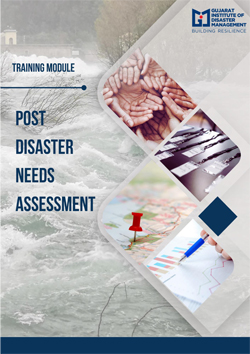 |
Training Module on Post Disaster Needs Assessment (PDNA)This training module on Post Disaster Needs Assessment (PDNA) equips professionals with skills to assess and support effective recovery operations. It provides sector-specific guidelines for PDNA across three areas: productive sectors (agriculture, livestock, fisheries, forestry, mining, manufacturing, trade, tourism), infrastructure (electricity, water supply, sanitation, transport, communication), and social sectors (housing, education, health, culture, environment). The module covers methodologies for assessing damage, loss, and needs, highlighting the importance of coordinated and inclusive approaches to address the needs of all communities, including vulnerable groups. It includes case studies and practical exercises, offering hands-on experience and good practices. The module also connects PDNA to the Disaster Recovery Framework (DRF) for effective recovery planning, ensuring readers gain comprehensive knowledge and tools for multi-sector PDNA. Year of publication - July, 2024 View | Download |
| 2 | 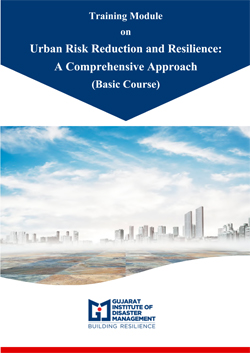 |
Urban Risk Reduction and Resilience: A Comprehensive Approach (Basic Course)This training module on Urban Risk Reduction and Resilience: A Comprehensive Approach aims to address the vision and support the policy makers and urban practitioners with an ability to prepare for enhancing urban resilience. The ToT model is envisaged to act as multiplier of trainers in the state; thereby creating a self-sustaining process involving knowledge transfer. The module is divided into three parts: Basic Course, Specialized Course for Policymakers, and Specialized Course for Practitioners.The Basic course is an introductory level course. It aims to create a level-playing field for learners belonging to varied sectors and having different levels of understanding and knowledge of DRR and CCA. The course comprises five training sessions with sixteen learning units and has a duration of sixteen hours and thirty minutes. The learners will engage in discussion, field visit, and group exercises. Year of publication - July, 2023 View | Download |
| 3 | 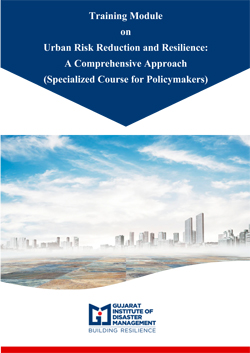 |
Urban Risk Reduction and Resilience: A Comprehensive Approach (Specialised Course for Policymakers)Having completed the comprehensive Basic Course on Urban Risk Reduction and Resilience which introduced the learners to the key concepts, legislations, frameworks, tools and practices of disaster risk management, climate change adaptation, urban systems and associated risks, urban resilience and urban governance, the focus of the Specialized Course for Policymakers is to dive deeper into specific aspects where the urban policymakers can play a crucial role. For effective learning and take away from the current course, it is expected that the participants have duly completed the Basic Course before getting enrolled for this course. The current course is a fast paced two days course of six hours total dedicated for the urban policy makers from the Urban Development and Urban Housing Department, Government of Gujarat along with key policy/decision makers from varied Municipal Corporations, Municipalities, Urban Development Authorities of the state. Year of publication - July, 2023 View | Download |
| 4 | 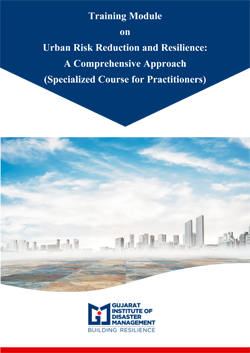 |
Urban Risk Reduction and Resilience: A Comprehensive Approach (Specialised Course for Practitioners) DescriptionHaving completed the comprehensive Basic Course on Urban Risk Reduction and Resilience which introduced the learners to the key concepts, legislations, frameworks, tools and practices of disaster risk management, climate change adaptation, urban systems and associated risks, urban resilience and urban governance, the focus of the Specialized Course for Practitioners is to dive deeper into specific aspects where the engineers, architects, urban planners can play a crucial role. For effective learning and take away from the current course, it is expected that the learners have duly completed the Basic Course before getting enrolled for this course. The current course is a fast-paced three days course dedicated for the practitioners from the Urban Local Bodies from varied Municipal Corporations, Municipalities, Urban Development Authorities of the state. The course comprises five training sessions with eleven learning units and group exercises with a total duration of eight and a half hours. Year of publication - July, 2023 View | Download |
| 5 | 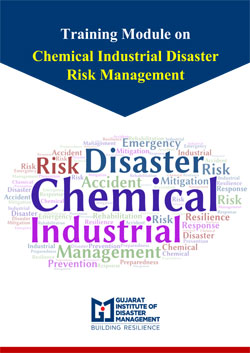 |
Chemical and Industrial Disaster Risk Management (CIDRM)This module on Chemical & Industrial Disaster Risk Management (CIDRM) aims to enhance facilitators' abilities in delivering impactful training programs that address the unique challenges and risks associated with chemical and industrial disasters. It emphasizes the adoption of preventive and mitigation strategies as a means to achieve effective CIDRM. Unlike disasters caused by natural hazards, most chemical disasters are preventable, making it crucial to prioritize proactive measures. By understanding the principles and best practices of CIDRM, facilitators will be better prepared to educate others and promote a culture of safety in chemical and industrial settings. Year of publication - April, 2023 View | Download |
| 6 | 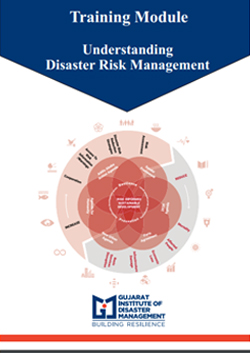 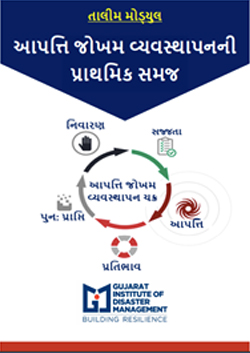 |
Understanding Disaster Risk ManagementDisaster Management is perhaps one of those subjects which is unique in its own way. On one hand it has undergone a complete paradigm shift from mere management to risk reduction and risk management and on the other hand, countries and states, all over the world, are trying hard to mainstream disaster risk management in development planning. With global phenomenon like climate change looming large at the horizon, the consequences and aftermaths of any extreme event will be disastrous, if the risk which is posed by such events is not reduced or managed. And to this, everyone needs to contribute. The onus rests not only on the government and governing authorities but also on the citizens and residents. Thus, everyone needs to be empowered to understand the risks they live in. This particular training manual, which can be used by trainers as well as for self-education, does exactly that. The different units of the module explain the various controllers of disaster risk and elaborates on how they are related to each other. Care has been taken to explain these crucial parameters as lucidly as possible. Starting from the fundamentals, the module builds upon and gradually talks about the different aspects of disaster risk management. In addition to this, national and international arrangements have also been discussed like the relevant statutes at national level, the Sendai Framework for Disaster Risk Reduction (SFDRR), Sustainable Development Goals which include 17 goals, the Paris Agreement etc
Year of publication - May, 2019 English: View | Download Gujarati: View | Download |
| 7 | 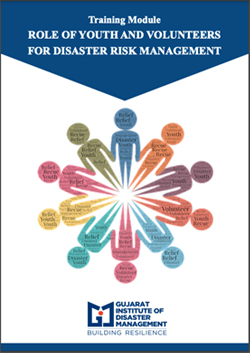 |
Role of Youth and Volunteers in Disaster Risk ManagementSendai Frameworks for Disaster Risk Reduction (SFDRR) 2005-2030 talks about ‘all-of-society’ and SDG talks about ‘leave-no-one-behind’. With India, as a Nation of Youth population, the onus lies with us to empower our youth, so that they can design their own Resilient and Sustainable future. Moreover, Disaster Management Policy of India formulated in 2009 emphasizes on Involvement of Community, Civil Defense Volunteers, NGOs, Ex-Servicemen and Youth organizations in all aspects of Disaster Management. It lays down roadmap/directions for holistic and pro-active approach towards prevention, mitigation and preparedness. GIDM has constituted a Program Development and Review Committee (PDRC) on theme “Role of Youth and Volunteers for Disaster Risk Management” on 26-Nov-2018, by involving concerned stakeholders from various Department of Government of Gujarat, namely Sport, Youth & Cultural Activities Dept. and Education Dept., NCC, NSS, NYKS, Civil Defence & Home Guards, Bharat Scout & Guide, Indian Red Cross Society etc. Keeping the importance of the subject, GIDM, in association with its PDRC Members and GIDM Editorial Board, has developed this Training Module on the subject. This module provides the trainer or the facilitator with ideas to conduct an introductory awareness on Basics of Disaster Risk Management, Disaster Management in terms of Rescue, Relief and Rehabilitation and Role of Youth Volunteer organizations in Disaster Management. Year of publication - November, 2019 View | Download |
| 8 | 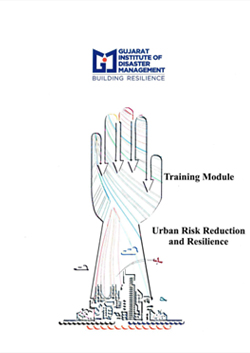 |
Urban Risk Reduction and ResilienceThe training module on Urban Risk Reduction and Resilience focuses on various aspects of disaster risks in urban areas. Factors like concentration of population, economic activities, building activities and networks in urban areas result in aggravated risk from disasters and at times, these factors end up causing disasters as well. The module is designed to provide a common platform of knowledge for urban development professionals and disaster management professionals. The module can be used by trainers in the disaster management and/or urban development sectors for imparting training to the state and city level officials on urban risk mitigation. The module can also be used for self-study by urban development professionals, disaster management professionals, officials from the Urban Local Bodies (ULBs), Autonomous Bodies, NGOs etc. Year of publication - March, 2019 View | Download |
| 9 | 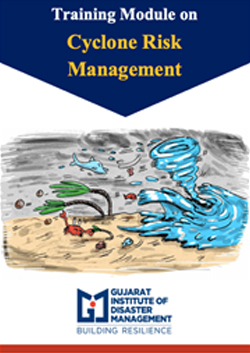 |
Cyclone Risk ManagementThe training module on Cyclone Risk Management has been developed for trainers to educate the commoners about the cyclone risks around them and intuitively train them to be prepared for it. The module focuses on all parameters of cyclones risk like cyclone hazard & vulnerability assessment, relevant exposure, mitigation measures and response/recovery plans without going into the technicalities. The ultimate objective of the module is to empower every participant to be able to assess cyclone risks and be getting themselves acquainted with cyclone preparedness and response/recovery plan. Year of publication - March, 2020 View | Download |
| 10 | 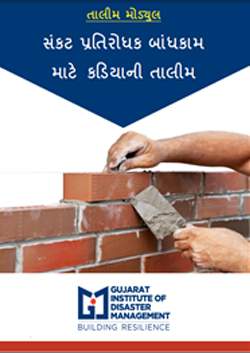 |
Module for Masons on Hazard Resistant ConstructionThis training module, designed on the basis of NDMA guidelines, has been contextualised to suit the needs of masons in Gujarat to strive towards hazard resistant construction practices. This module is in Gujarati to help more and more people working in the field to be aware of these practices. Year of publication - March, 2021 View | Download |
| 11 | 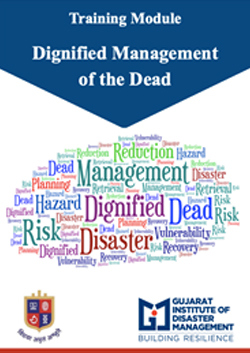 |
Dignified Management of DeadThe National Disaster Management Authority has issued a Guidelines on “Management of the Dead in the Aftermath of Disasters” August 2010. In this backdrop, GIDM embarked upon the task of formulating the training module on the subject. It not only provides the technical information, but also dwells on administrative aspects that will support the correct approach in handling dead bodies, with the highest possible quality standards/measures, functioning in an interdisciplinary manner, designed to contribute to positive identification of victims. It deals with the subject in a balanced and thorough manner giving the information required to formulate this facet in the National, State and District "all hazard" Disaster Risk Management Plans, and thereupon, the Standard Operating Procedures (SOPs) by all stake-holders. Year of publication - October, 2019 View | Download |
| 12 | 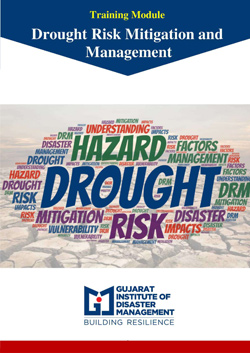 |
Drought Risk Mitigation and ManagementDroughts are recurrent events that affect large areas each year. Their lengths are highly variable, from a few weeks to many years. They are challenging to characterize and manage due to their slow onsets (in most cases) and indeterminate ends. After the intervention of Hon. Supreme Court of India, Govt. of India brought a technology-based comprehensive drought manual for timely drought declaration, DRR, and relief. Present Drought Module "Drought Risk Mitigation and Management" intended to deliver the training to Mamlatdar, Dy. Mamlatdar, Mamlatdar (Disaster Management) Engineers, Agriculture Dept. Officials about the Drought Introduction, Causes of Drought, Drought Hazard, Vulnerability and Risk Assessment with the detailed Mitigation & Response measures with a Kachchh District 2016-19 case study. Description and the explanations are eloquent with pertinent data & examples. Year of publication - October, 2020 View | Download |
| 13 | 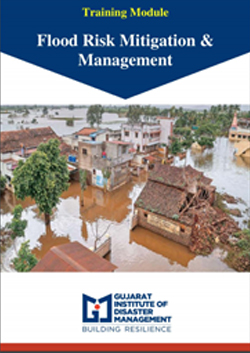 |
Flood Risk Mitigation & ManagementFlood Risk Mitigation and Management Module aimed to deliver the training to Engineers, Mamlatdars, Agriculture officer about the Flood Introduction, Causes of Flood, Flood Hazard, Vulnerability and Risk Assessment with the detailed Mitigation & Response measures with a case study. Description and the explanations are lucid with relevant examples. Year of publication - November, 2020 View | Download |
| 14 | 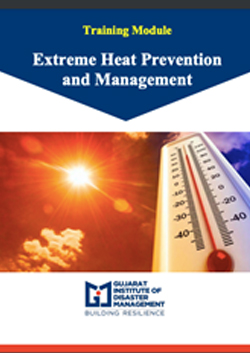 |
Extreme Heat Prevention & ManagementIt is absolutely necessary to be aware of extreme heat and its risk in the first place to take any measures to adapt to it and to mitigate its harm. This module has been developed to help the trainers use it for the training of participants working in various government and non-government organizations and have a direct or indirect role in protecting the health of people from extreme heat during summers. This module will work as the guide for the trainer to train the participants on the key areas necessary for planning the prevention and management of extreme heat to minimize impacts on the health of people. Year of publication - March, 2021 View | Download |
| 15 | 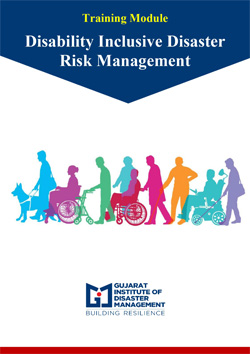 |
Training Module on Disability Inclusive Disaster Risk ManagementYear of publication - September, 2022 View | Download |